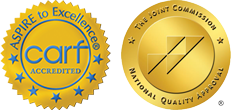People who have completed addiction treatment or are about to finish a treatment program are often advised to figure out their aftercare plan for substance abuse. But not everyone is sure what exactly it means to have an aftercare plan and how to go about creating one.
Please continue reading for real world examples and practical tips on creating an effective aftercare plan, if you or a loved one is recovering from a substance use disorder.
What is Aftercare?
Aftercare refers to the ongoing support provided to people after they have completed formal addiction treatment (inpatient or outpatient treatment programs for substance use disorders).
The goal is to help such individuals prevent relapse and maintain sobriety. To this end, an aftercare plan for substance abuse typically includes elements such as ongoing therapy, peer support groups, sober living arrangements, and continued monitoring.
An aftercare plan is therefore a personalized relapse prevention plan based on the individual’s needs. It is a powerful tool for navigating the common challenges involved in transitioning to daily life after a formal addiction treatment program ends. A good aftercare plan offers structure and resources to ensure long-term recovery.
How Does an Aftercare Plan Differ from a Treatment Plan?
A treatment plan is designed to address the initial and immediate needs of someone receiving addiction treatment. It is offered at a treatment center and focuses on medical detox, management of withdrawal symptoms, psychotherapy, and behavioral interventions. A treatment plan typically covers the period during which a person is in active treatment for a substance use disorder.
Aftercare programs, on the other hand, come into effect once the formal addiction treatment program concludes. An aftercare program is offered in the community setting as well as at addiction treatment facilities. It focuses on maintaining long-term recovery after substance abuse treatment such as detox and intensive counseling.
The goal of an aftercare plan for substance abuse is to prevent relapse and provide long-term support in daily life.
Creating an aftercare plan includes a range of strategies, such as ongoing counseling from mental healthcare professionals, support groups, the person’s own support network of friends and family members, and lifestyle adjustments such as sober living arrangements.
Essentially, the addiction treatment plan addresses initial recovery, while aftercare supports sustained sobriety over time.
How Do You Create an Aftercare Plan?
Addiction treatment requires a highly individualized approach that is tailored to your specific challenges and needs. The same is true for aftercare programs. No two people have the same experience with substance abuse and no two people have a similar recovery from addiction. For this reason, it is vital to create an aftercare plan that is designed for your unique situation.
Each of the following sections of an aftercare plan should be developed under the guidance of mental health professionals and members of your support network, such as friends and family members.
Successful long-term recovery is achievable, but depends largely on careful aftercare planning after completing formal addiction treatment. Therefore, it’s important to begin aftercare planning before leaving a formal treatment program. It’s also important to periodically review your aftercare plan and make changes as necessary, as you progress through recovery or experience changes in life circumstances.
Types of Aftercare Programs
As mentioned, an aftercare program for substance abuse provides ongoing support to individuals in recovery, helping to maintain sobriety and prevent relapse. Aftercare programs include a range of services based on personal needs and long-term goals.
Sober Living Homes
Sober living homes provide a safe, structured, substance-free living environment for people who are transitioning from addiction treatment centers to everyday life in society. The goal is to provide an environment that supports recovery by offering peer support and encouraging accountability. In addition to sober living homes and halfway houses, environmental support may include:
- Sober living or interactions with supportive family members
- Employment opportunities that encourage sobriety
- Spiritual support from religious leaders
- Social groups that offer a safe, structured, drug and alcohol-free environment
Alumni Programs
Alumni programs connect graduates of treatment centers for continued support through events and check-ins. The goal of alumni programs is to foster a sense of community, reduce feelings of isolation, and help people learn from others and share their experiences.
For example, a treatment center may offer a recovery-oriented social event, such as a sober hiking trip or a group outing to a sporting event. to its alumni. These activities allow people who are in recovery from substance use disorders to connect with peers in a supportive environment. The activities reinforce a sense of community while allowing a person to safely engage in enjoyable, substance-free experiences. The goal is not only to provide ongoing encouragement but also help individuals build healthy, sober lifestyles through positive, shared experiences.
Support Groups
Support groups, such as 12-Step programs (e.g., Alcoholics Anonymous), provide a safe space for people in addiction recovery to share experiences and receive guidance from peers. This type of mutual support is proven to be effective for relapse prevention.
Examples of peer support groups include:
- Alcoholics Anonymous (AA)
- Narcotics Anonymous (NA)
- Gamblers Anonymous
- Overeaters Anonymous
- Adult Children of Alcoholics
- Al-Anon Family Groups such as Alateens
Ongoing Therapy and Medication Management
Most people who complete formal addiction recovery continue receiving ongoing therapy after they graduate from the treatment program. Ongoing therapy involves going to regular counseling sessions, often with a focus on relapse prevention and coping strategies.
The goal is to re-address the underlying issues that triggered substance use in the first place as well as learn coping strategies for challenges that arise during transition to daily life or due to changes in life situations.
Mental health professionals can offer ongoing therapy in the form of intensive outpatient programs, outpatient therapy, family therapy, couples therapy, and professional monitor services, for example, periodic drug screens.
In addition, people who have completed inpatient addiction treatment may continue receiving medications to manage their substance use disorder. For example, those in recovery from opioid addiction may receive buprenorphine, methadone, or naltrexone. Alcoholics in recovery may continue medication management with acamprosate, naltrexone, or disulfiram. These prescription medications help to reduce the euphoric effects of drugs, reduce cravings, and help you stay sober long-term.
Relapse Prevention
A strong aftercare plan for substance abuse should include relapse prevention and crisis management strategies. While it’s impossible to foresee every event, preparing for common triggers and challenges is key.
Identifying cravings, recognizing early warning signs of relapse, and knowing who to contact can greatly increase your or your loved one’s chances of staying sober.
As part of your crisis management plan, make a list of the following:
- People, places, or situations that might cause you to relapse to substance abuse.
- Techniques, practices, and sober hobbies that can help you cope with cravings and triggers.
- Emergency contacts or people you can contact (supportive family members and friends) or addiction hotlines.
- Daily routines and structures that can help you maintain stability and avoid temptations and triggers.
Case Management
Case management services help individuals in addiction recovery navigate various aspects such as housing, employment, and medical care. The case manager ensures a person stays on track and has access to necessary resources.
For example, case management in aftercare for substance abuse may involve coordinating access to sober housing and helping a person with employment resources after leaving formal addiction treatment. In addition, the case manager can monitor your progress, ensuring you stay engaged with recovery services like psychotherapy and support groups.
Case managers can also assist with medical appointments, legal complications, and financial planning. The goal of case management in aftercare planning is to offer you comprehensive and ongoing support tailored to your needs.
Why is Aftercare in Addiction Recovery Important?
Aftercare is addiction recovery is important because it provides continued support and structure after formal substance abuse treatment ends. Aftercare therefore plays a vital role in helping people avoid relapse and maintain sobriety.
Recovery is an ongoing, long-term process, and aftercare programs—such as continued therapy, medication management, peer support groups, and sober living—address common challenges that arise post-treatment.
A good aftercare plan for substance abuse encourages accountability, provides support and coping strategies, and helps you build a strong support network. These are all essential for reinforcing the skills and mindset necessary for sustained recovery. Without aftercare, people in recovery are at a much higher risk of returning to substance use.
Benefits of Aftercare in Addiction Recovery
- Relapse Prevention: Aftercare provides you with the tools and support you need to avoid triggers and manage cravings.
- Continued Support: An aftercare program offers emotional and social support through talk therapy and peer support groups.
- Accountability: Regular check-ins are part of aftercare programs and ensure adherence to your recovery goals.
- Skill Reinforcement: Aftercare planning is designed to reinforce coping strategies learned during addiction treatment.
- Social Integration: Aftercare helps in building healthy relationships and sober lifestyles.
- Access to Resources: Aftercare programs help with housing, employment, and medical needs.
- Long-term Focus: Aftercare increases the chances of sustained recovery through gradual adaptation to everyday life challenges.
Examples of Effective Aftercare Plans
An aftercare plan is a structured program that can help you maintain sobriety after completing addiction treatment. A detailed aftercare plan can provide ongoing support through counseling and therapy, support groups, lifestyle changes, and relapse prevention strategies.
Your aftercare plan should be tailored to your needs. It should focus on long-term recovery by addressing both emotional and practical challenges that are unique to you.
Do you have a loved one struggling with addiction?
We know how hard that can be. Give us a call to find out what options you have.
For example, after completing an inpatient (residential) treatment program, you might transition to a sober living home (halfway house) where you live in a structured, substance-free environment for a few weeks, before moving to an independent unit. You attend weekly therapy sessions to address personal challenges and triggers while continuing to work on emotional healing. To maintain accountability and stay connected with peers, you go to weekly meetings with peer support groups such as Alcoholics Anonymous (AA) or Narcotics Anonymous (NA). Your new support network builds upon and reinforces the coping strategies you learned during addiction treatment, helping you stay sober.
Another example of aftercare planning: You receive a detailed daily routine from the treatment center after completing a formal inpatient treatment program. Your aftercare plan for substance abuse includes ongoing therapy sessions, including cognitive-behavioral therapy (CBT), to address underlying emotional issues. You are also encouraged to regularly attend support group meetings and stay engaged with the local recovery community. Additionally, your crisis plan includes a list of emergency contacts—therapists, sponsors, and trusted friends and family members—alongside strategies to manage cravings and avoid triggers. This structured plan helps you handle everyday challenges and offers stability in your recovery journey.
Tips for Creating a Successful Aftercare Plan
A successful aftercare plan is one that is tailored to your unique needs. This aftercare plan should help you maintain sobriety and ensure long-term recovery. Here are some tips to help you create an effective aftercare plan.
Engage Professional Help
Work with therapists, counselors, and case managers at your treatment center to develop a personalized aftercare plan that addresses your needs and goals. Mental health professionals understand your challenges and can help you develop an aftercare plan that can address them.
Involve Loved Ones
Substance abuse and addiction recovery can feel incredibly isolating, in part due to the stigma attached to alcohol and drug abuse. But you should not try to do it alone. It’s important to include family members and friends in the aftercare process for additional support, accountability, and encouragement during your journey to lasting sobriety.
Utilize Available Resources
Mental health professionals at your treatment center can connect you with community resources that promote sobriety. Take advantage of resources such as support groups and recovery services that can give you vital ongoing assistance and help you build connections with sober networks. These people will ultimately become your tribe and help you live a substance-free life that is happy and fulfilling.
Be Patient and Persistent
Setbacks are common during the addiction recovery process. In fact, experts estimate that 40-60% of people in recovery have at least one relapse. Recognize that recovery is a process that takes time. Stay committed to your aftercare plan for substance abuse and be willing to adapt it as needed for continued success.
What are Common Challenges Faced During Aftercare Planning?
Aftercare planning can feel overwhelming and challenging. But not having an aftercare plan in place can have a huge negative impact on your recovery. The most common challenges people facing during aftercare planning include:
Identifying Triggers
Understanding personal triggers can be difficult, leading to unpreparedness in managing cravings. Healthcare professionals at your treatment facility can help you understand your triggers.
Lack of Support
Insufficient support from family and friends can hinder motivation and accountability and cause setbacks in recovery. If your loved ones are not supportive of a sober lifestyle, build a new support network in the recovery community.
Resource Accessibility
Limited access to recovery resources, such as therapy or support groups, can make it challenging to maintain sobriety. Your therapists and counsellors can connect you to community resources while creating an aftercare plan for you.
Adapting to Change
Adjusting to life after treatment can be overwhelming, creating stress and uncertainty. An addiction treatment program that offers aftercare planning can help make the transition easier and safer.
Dealing with Setbacks
Setbacks are a common part of the recovery journey. It’s important to approach them with self-compassion and understanding. Recognize that setbacks are not a failure and you can learn these experiences. Develop a plan to address potential triggers and seek support from peers or professionals to navigate challenges effectively.
Staying Motivated
Many people in recovery from substance use disorders find it challenging to stay motivated during aftercare. The key is to set realistic goals and celebrate small achievements. Continue to engage in positive activities, surround yourself with supportive loved ones, and remind yourself of how far you have come and your reasons for pursuing sobriety. Turn to your support network if you are struggling to maintain enthusiasm for recovery activities.
Balancing Life Responsibilities with Aftercare
Balancing life responsibilities with aftercare activities can be challenging for many people. It’s essential to prioritize recovery while managing work, family, and social obligations. Create a structured schedule that allocates time for therapy, support groups, and self-care, while also allowing for daily responsibilities. This will help you maintain stability in your life and stay on track in your recovery journey.
What Factors are Important in Maintaining Sobriety?
Healthy lifestyle changes play a critical role in helping to maintain sobriety during aftercare for addiction recovery. Here are some of the lifestyle and self-care measures you should include in aftercare planning:
Find Ways to Destress
There are several effective stress-relief techniques, such as mindfulness, meditation, yoga, tai-chi, and creative hobbies that can help you manage daily stressors without resorting to substance abuse. Make sure you include stress-relieving activities in your aftercare plan based on your interests and activities available near you.
Eat a Balanced Diet
Substance abuse takes a heavy toll on both your mental health and physical health. Nutrition plays a vital role in your recovery. A healthy, balanced, nutritious diet can support recovery by optimizing your physical health, boosting your mood, and enhancing overall well-being.
Stay Physically Active
Regular physical activity has multiple benefits, including improved mental health, reduced stress, and a healthy outlet for emotions. These can all go a long way in reinforcing your commitment to sobriety. Include some form of physical activity or exercise in your daily routine as part of your aftercare plan.
Protect Your Mental Health
Prioritize your mental health by going to regular therapy sessions, practicing self-care, and attending support group meetings. These activities will help to address underlying issues that can trigger a return to substance abuse. By proactively protecting your mental health and including healthy activities in your aftercare plan, you can maintain emotional stability, which is essential for lasting recovery.
How to Maintain Sobriety After Treatment?
To maintain sobriety after addiction treatment, it’s essential that you develop an aftercare plan. This should include building a supportive network, engaging in ongoing therapy, and establishing a structured daily routine.
Also, develop healthy coping mechanisms for stress, prioritize your physical and mental well-being through exercise and nutrition, and stay connected with recovery communities.
Additionally, recognize your triggers and have a plan in place to address cravings.
Creating an aftercare plan for substance abuse with all these elements will give you the best chance of navigating the challenges of recovery. Your aftercare plan is the best tool you have for staying committed to your journey towards a fulfilling, substance-free life.
How Discover Recovery Can Help
At Discover Recovery Treatment Center, we believe creating an effective aftercare plan for substance abuse recovery plays a crucial role in maintaining long-term sobriety.
We can help you with aftercare planning by providing personalized support that addresses your individual needs. Highly experienced mental health professionals at our treatment center can develop a comprehensive aftercare plan for you, offer ongoing talk therapy, and connect you with community resources like support groups, as well as offer guidance on coping strategies and lifestyle adjustments.
Our relationship with you does not end when you graduate from an outpatient or inpatient treatment program. We are committed to giving you ongoing support, whether it is access to sober living environments, ongoing counseling, or other services to ensure a smooth transition from treatment to daily life.
Our holistic approach is proven to significantly increase the likelihood of sustained sobriety and overall well-being. For more information on our aftercare programs, visit our website or call us at Discover Recovery today.
Frequently Asked Questions (FAQs)
What Does an Aftercare Plan Include?
An aftercare plan typically includes ongoing therapy, support group participation, coping strategies, sober living, other community resources, emergency contacts, and other relapse prevention techniques tailored to an individual’s needs.
Can an Aftercare Plan Help Prevent Relapse?
Yes, an aftercare plan can significantly reduce the risk of relapse by providing safety, structure, support, and coping strategies to manage cravings and triggers.
How Can an Aftercare Plan Support Long-Term Recovery?
Aftercare plans support long-term recovery by maintaining accountability, providing access to resources, and helping you build a supportive community that encourages sober behaviors and emotional well-being.
What is the Duration of a Typical Aftercare Plan?
The duration of an aftercare plan varies but often extends from several months to years, depending on individual needs and circumstances.
Who Helps Create an Aftercare Plan for Substance Abuse?
An aftercare plan is typically created by healthcare professionals, including therapists, counselors, and case managers at an addiction treatment facility.





